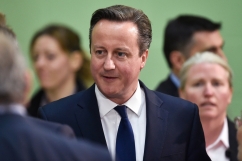The leaders of four Protestant denominations have written an open letter to Prime Minister David Cameron urging him to review the benefit sanctions regime and to delay a decision on replacing the Trident nuclear weapons system.
They also urge "assertive international action to uphold human rights and deliver humanitarian assistance in Syria" and "action to make freedom of religion a human rights priority in all aspects of foreign policy".
The open letter to the Prime Minister was signed by leaders of the Baptist Union of Great Britain, the Church of Scotland, the Methodist Church and the United Reformed Church.
It says: "We hope and pray that as you make decisions about your programme for government, you will choose to offer greatest support to those of our neighbours who are the weakest, the most vulnerable and the most in need of our help. Such policies will not always be popular, they may be politically or financially costly, but they are necessary if we are to live out the common good."
The letter refers to the role played by local churches in delivering social programmes.
However, it say that "Our experience and research has led us to be deeply concerned about the damage caused, particularly to vulnerable people, through the benefits sanctions system."
On Trident, it refers to international calls to make the use of nuclear weapons illegal under international law and calls for "a deferral of a decision on Trident in 2016 to enable the UK to play a full part in new multilateral disarmament initiatives".
Baptist Union of Great Britain spokesman Rev Stephen Keyworth said: "The implementation of government policies is always difficult when resources are limited. While we applaud some of the achievements of the previous government, such as the reduction in unemployment, a commitment to combat climate change and ensuring 0.7 per cent of the national income is given in overseas aid, it is important for the new government to remember the key foundations for both domestic and global policies: truth, justice, peace and wellbeing."
















